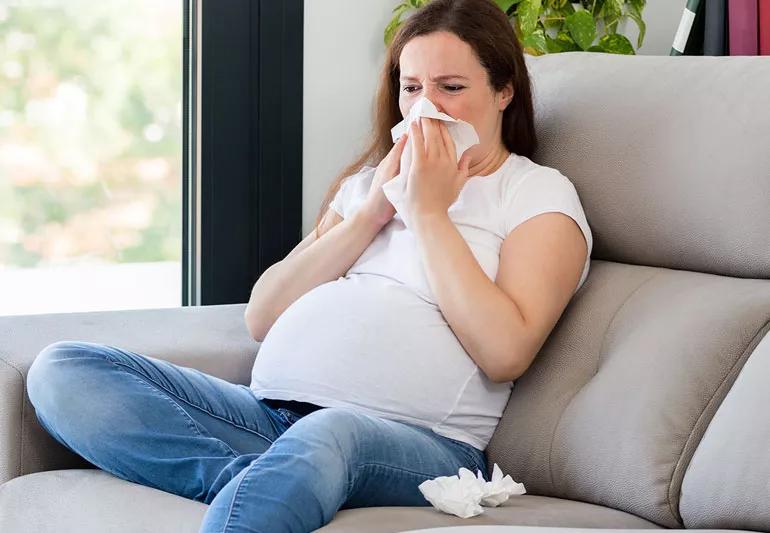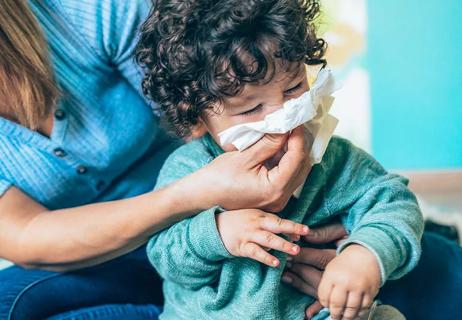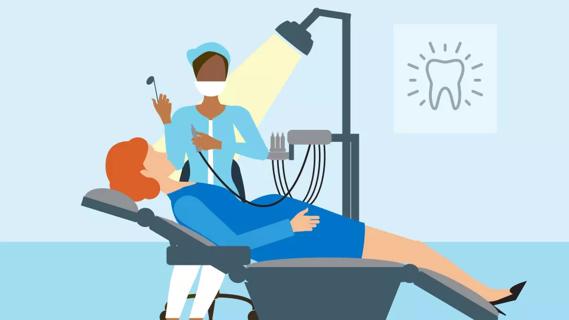Most antihistamines are OK, but avoid decongestants for at least the first trimester

Your nose is running, your eyes are itching and your belly is growing. And you’re wondering: Can I take allergy medicine while pregnant?
Advertisement
Cleveland Clinic is a non-profit academic medical center. Advertising on our site helps support our mission. We do not endorse non-Cleveland Clinic products or services. Policy
If you’ve lived with seasonal allergies, you probably already know what usually eases your symptoms. Your medicine cabinet may already be well-prepared for the onslaught of allergens that get your nose a-dripping.
Your allergies may be a real bother for you. But take comfort in knowing that your symptoms won’t interfere with healthy fetal development, says Ob/Gyn Salena Zanotti, MD.
But how you treat your allergies could impact your pregnancy. Take care in choosing treatments that are appropriate for your symptoms and are pregnancy-safe.
And you may already know some medications are off-limits during pregnancy. The same is true of allergy meds. Some you can keep taking. Others should be avoided. And some allergy meds might be OK depending on the situation.
It’s a lot to sift through. Dr. Zanotti helps sort it out.
It’s safe to take certain allergy relief medications when you’re pregnant, but you’ll want to choose wisely. You may be able to take the edge off your allergies with some non-medication options as well.
Your options may be different depending on your health and any other risk factors associated with your pregnancy. So, it’s always best to talk with your healthcare provider about the best allergy relief for you during your pregnancy.
Advertisement
“No medication is 100% safe for 100% of people,” Dr. Zanotti says. “That’s true whether you’re pregnant or not. And during pregnancy, even choices that are generally considered safe can still carry some small degree of risk. If your symptoms are severe, some medications are better than others. For more mild symptoms, there are other, non-medication ways to feel better.”
Dr. Zanotti shares these options.
| Allergy medicine | Safety |
|---|---|
| Antihistamine tablets | Generally considered safe. |
| Antihistamine nasal spray | Not enough evidence to consider safe. |
| Nasal steroid spray | Generally considered safe. |
| Allergy shots | Generally considered safe if used prior to pregnancy. Avoid starting new during pregnancy. |
| Decongestants (pills and sprays) | Generally considered safe after the second trimester. Avoid if you have high blood pressure. |
| Herbal allergy relief remedies | Not enough evidence to consider safe. |
| Allergy medicine | |
| Antihistamine tablets | |
| Safety | |
| Generally considered safe. | |
| Antihistamine nasal spray | |
| Safety | |
| Not enough evidence to consider safe. | |
| Nasal steroid spray | |
| Safety | |
| Generally considered safe. | |
| Allergy shots | |
| Safety | |
| Generally considered safe if used prior to pregnancy. Avoid starting new during pregnancy. | |
| Decongestants (pills and sprays) | |
| Safety | |
| Generally considered safe after the second trimester. Avoid if you have high blood pressure. | |
| Herbal allergy relief remedies | |
| Safety | |
| Not enough evidence to consider safe. |
Antihistamine medications block the effects of histamine, a trigger for allergy symptoms. They’re some of the most widely used over-the-counter medications for seasonal allergies.
The American College of Obstetrics and Gynecologists says these antihistamine tablets are safe in pregnancy:
“Antihistamine tablets are typically the first-line medication option for treating allergy symptoms in pregnancy,” Dr. Zanotti says.
You’ll want to read product labels closely. Some antihistamines you find in the store may also contain decongestants, which some people who are pregnant shouldn’t use. (More on that in a bit.) One sign your antihistamine contains a decongestant is the letter “D” at the end of the brand name, like Claritin-D® or Zyrtec-D®. Or you might see words like “cold relief” or “congestion relief” on the packaging.
Antihistamine nasal sprays are also available. But Dr. Zanotti says not enough research has been done to know if they’re safe during pregnancy. Until more research is done, it’s better to avoid nasal antihistamine sprays.
In addition to antihistamines, some people find relief from steroid nasal sprays. That includes brands like Nasonex®, Nasacort® or Flonase®.
These sprays are safe to use throughout pregnancy, at the same recommended dosage, Dr. Zanotti says. If your allergies are really kicked into high gear, you can use both an oral antihistamine and nasal spray together.
You may have heard that some nasal sprays can be addictive, but that’s only true of decongestant sprays. Those shouldn’t be used when you’re pregnant. Steroid sprays aren’t habit-forming. If fact, they should be used regularly to have the best effect.
Nasal sprays are most effective when used correctly: Don’t tilt your head back or inhale them in.
Additionally, you could try saline nasal sprays. Those products use a combination of water and salt. They’re safe for pregnancy. And they can be an effective, non-medicinal solution for your nasal congestion.
Allergy shots (allergen immunotherapy) help minimize allergic reactions. They work by exposing you repeatedly to very small amounts of allergens. People who choose this treatment for allergy relief typically get an injection each week over a period of several years.
Advertisement
If you started receiving allergy shots before pregnancy and they help your symptoms, it’s safe to continue them, notes Dr. Zanotti. But pregnancy isn’t usually the right time to start up allergen immunotherapy treatment.
“We don’t recommend starting allergy shots during your pregnancy because you don’t know what reaction you’ll have,” she continues.
Some people have negative reactions to allergy shots, including a drop in blood pressure, hives and trouble breathing. If you haven’t had allergy shots before, you can’t know if you’ll have a reaction that could impact healthy fetal development.
Before you were pregnant, popping a decongestant may have been your go-to for that sweet, sweet, nasal relief. But decongestants like pseudoephedrine (Sudafed®) should be considered off-limits for the first trimester.
Research shows that use of oral decongestants increases the risk of birth defects. Researchers say that nasal decongestant sprays may carry similar risks.
Dr. Zanotti says that risk drops after the first trimester, so it’s OK for some people to use decongestant medication later in their pregnancy.
But if you have high blood pressure, you should avoid using decongestants, no matter how far along you are in your pregnancy.
Advertisement
“Decongestants narrow blood vessels in your nose. That opens up your airways and reduces swelling that leads to things like stuffy noses,” she explains. “That narrowing, though, can affect other blood vessels, too, and further increase your blood pressure.”
Some people swear by specific herbs and other natural remedies for allergy relief. You may have even tried options like echinacea, mullein or grape seed extract in the past. Or maybe you swear by applying a bit of lavender, eucalyptus or tea tree oil to clear up your sinuses.
But the effects of herbal supplements and aromatherapy oils during pregnancy haven’t been well studied. Dr. Zanotti says it’s better to steer clear of these options.
Medication isn’t the only option for relieving your allergy pressure. Some people decide medications aren’t right for them, especially if their allergy symptoms are mild. You may find that there are some home remedies that can do the trick — and keep you safe during your pregnancy.
Advertisement
Allergies can be a real drag, especially if you’re already dealing with other pregnancy discomforts, like back pain or morning sickness. Luckily, there are pregnancy-safe options for allergy relief. And, remember, the issue is only temporary.
“Your symptoms may be unpleasant, but bear in mind that neither pregnancy nor seasonal allergy symptoms last forever,” reassures Dr. Zanotti. “There’s light at the end of the tunnel.”
Learn more about our editorial process.
Advertisement

Autumn allergens typically begin to bloom — and release their pesky pollen — around August

Sneezing, coughing and clear mucus shouldn’t be ignored

Practical advice to cope, avoid symptoms

Your best ways to get seasonal allergy relief

Talk with them about their new sibling early and often

Dental care is not only safe during pregnancy, but it’s also highly recommended

A healthy pregnancy diet includes good amounts of folic acid, DHA, calcium and more

If left untreated, you risk complications, early labor and passing the infection to your baby

Type 2 diabetes isn’t inevitable with these dietary changes

Applying a hot or cold compress can help with pain